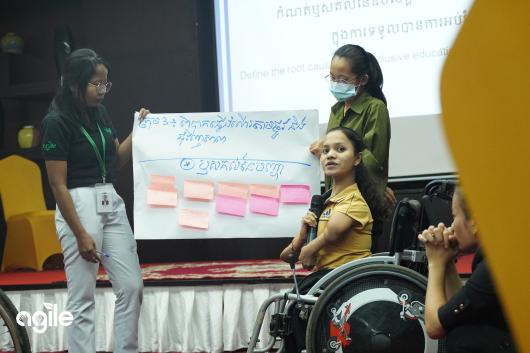
The week-long workshop for people with disabilities was launched with a ceremony attended by the Czech Embassy
23.05.2022 / 11:04 | Aktualizováno: 07.06.2022 / 13:53
On Monday May 23rd, a training called “Technical and Vocational Training: Temporary Training for Persons with Disabilities” was launched. This activity is a part of the project “Towards Inclusive Employment for People with Disabilities” co-implemented by Agile Development Group and People in Need Cambodia and funded by the Czech development agency . The launching ceremony was attended by the Czech Embassy together with Agile Development and H.E. Em Chanmakara from the Ministry of Social Affairs with opening remarks on our long-term efforts and cooperation.
People with disabilities are one of the most marginalised groups in the labour market in Cambodia. In general, these people are more likely to live in poverty in Cambodia, with unequal access to education and discriminatory recruitment practices being one of the main reasons. Therefore, since last year, People in Need has been implementing a project of the Czech Development Agency aimed at sustainable transition of people with disabilities towards decent and suitable employment opportunities.
According to available data, only 44% of children with disabilities in Cambodia complete primary school, compared to 73% without disabilities, while only 31% of young people in Cambodia have jobs that match their qualifications. However, national statistics do not include data on students with disabilities. Women with disabilities, in particular, have difficulty accessing formal Technical and Vocational Education and Training (TVET) course programmes. This gap continues to widen as the level of education progresses. Cambodia's TVET system is still in its infancy compared to neighbouring countries such as Thailand and Vietnam. An important factor in enabling persons with disabilities to find suitable employment opportunities is the need to address underlying biases, misunderstandings and limitations of the vocational training sector and the private sector recruitment process.
The project, entitled Promoting Employability and the Creation of New Decent Employment Opportunities for Persons with Disabilities in Cambodia, seeks primarily to improve access to decent employment opportunities for persons with disabilities through the acquisition of relevant skills that match the needs of the private sector, as well as support for them to run their own businesses, and ultimately more inclusive practices by employers. "The skill sets provided by technical and vocational education and training courses often do not match the requirements of employers. There is an urgent need to provide more opportunities to develop skills and qualifications relevant to the labour market by making these schools inclusive. When vocational training is accessible and relevant to labour market needs, it enables people with disabilities to acquire specific skills for employment, thereby increasing their chances of breaking the cycle of poverty and social isolation. The project therefore seeks to integrate tailored courses for persons with disabilities into existing curricula, in close collaboration with key government institutions and relevant stakeholders. The ultimate goal will be to facilitate the transition of persons with disabilities into long-term employment," says Jan Ciupa, mission coordinator at People in Need.
The private sector in Cambodia is currently not well adapted to hiring persons with disabilities. There is a law in Cambodia that states that employers must hire one person with a disability for every 100 employees, but it is not fully enforced and there are no consequences. There are only approximately ten private employment agencies in Cambodia that accept national and foreign job applicants. Very few people with disabilities have been recruited by these agencies to date.
In addition to creating accessible courses for people with disabilities, the project implemented by People in Need also aims to build trust, establish new links and build capacity. TVET staff will be educated about ethical sensitivity in the disability field, and trained on how to plan inclusive learning themselves. One of the planned training sessions aims to ensure that TVET staff have the necessary skills, knowledge and understanding to ensure that their courses are accessible to people with disabilities. The training will be delivered on a face-to-face basis and participants will be provided with the necessary resources and mentoring to ensure that TVET staff can deliver accessible inclusive courses in the long term.
"During the implementation of the project, our project team will assess how to ensure that TVET centres are appropriately adapted in response to the specific requirements of persons with disabilities. The team will focus primarily on physical accessibility, but also other barriers. Staff will be trained to better understand what physical barriers disabled people need to face if they want to attend the TVET courses. A participatory workshop will also be conducted on how to make existing spaces and TVET courses more inclusive," adds Jan Ciupa.
The project is expected to benefit about 80 people with disabilities in Phnom Penh by gaining access to piloted TVET courses and gaining access to business incubation and management training. It will also benefit 20-30 TVET staff trained in disability awareness, etiquette and inclusive course adaptation, as well as 20-30 employers in Phnom Penh. Around 15 officials at the Ministry of Labour and relevant institutions will also be trained. Another approximately 2,000 people from the general public will be involved in the awareness campaign.
People in Need Cambodia will implement the project in Phnom Penh in close collaboration with Agile Development Group, a social enterprise that creates economic opportunities and helps build independent living for people with disabilities in Cambodia. The project will also involve various stakeholders, including the Ministry of Social Welfare, Veterans and Youth (MoSVY), Ministry of Labour and Vocational Training (MLVT), the private sector; Cambodian Disabled People's Organizations, disability-focused NGOs, as well as relevant civil society organizations and associations.
















